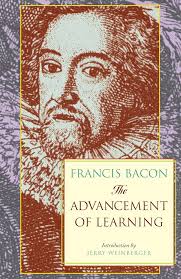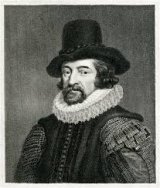The Advancement of Learning Page #30
The Advancement of Learning, published by Francis Bacon in 1605, is a foundational text in the history of science and philosophy. In this work, Bacon advocates for empirical research and the systematic organization of knowledge, laying the groundwork for the scientific method. The book critiques existing scholarly practices and proposes a new approach to learning based on observation and experimentation. It marks a significant shift towards modern scientific inquiry.
- Year:
- 1605
- 1,168 Views
Submitted by acronimous on August 11, 2024
Modified by acronimous on August 11, 2024
likewise the inquiry touching the operation or the relative and adventive characters of essences, as quantity, similitude, diversity, possibility, and the rest, with this distinction and provision; that they be handled as they have efficacy in nature, and not logically. It appeareth likewise that natural theology, which heretofore hath been handled confusedly with metaphysic, I have enclosed and bounded by itself. It is therefore now a question what is left remaining for metaphysic; wherein I may without prejudice preserve thus much of the conceit of antiquity, that physic should contemplate that which is inherent in matter, and therefore transitory; and metaphysic that which is abstracted and fixed. And again, that physic should handle that which supposeth in nature only a being and moving; and metaphysic should handle that which supposeth further in nature a reason, understanding, and platform. But the difference, perspicuously expressed, is most familiar and sensible. For as we divided natural philosophy in general into the inquiry of causes and productions of effects, so that part which concerneth the inquiry of causes we do subdivide according to the received and sound division of causes. The one part, which is physic, inquireth and handleth the material and efficient causes; and the other, which is metaphysic, handleth the formal and final causes. (4) Physic (taking it according to the derivation, and not according to our idiom for medicine) is situate in a middle term or distance between natural history and metaphysic. For natural history describeth the variety of things; physic the causes, but variable or respective causes; and metaphysic the fixed and constant causes. “Limus ut hic durescit, et hæc ut cera liquescit, Uno eodemque igni.” Fire is the cause of induration, but respective to clay; fire is the cause of colliquation, but respective to wax. But fire is no constant cause either of induration or colliquation; so then the physical causes are but the efficient and the matter. Physic hath three parts, whereof two respect nature united or collected, the third contemplateth nature diffused or distributed. Nature is collected either into one entire total, or else into the same principles or seeds. So as the first doctrine is touching the contexture or configuration of things, as de mundo, de universitate rerum. The second is the doctrine concerning the principles or originals of things. The third is the doctrine concerning all variety and particularity of things; whether it be of the differing substances, or their differing qualities and natures; whereof there needeth no enumeration, this part being but as a gloss or paraphrase that attendeth upon the text of natural history. Of these three I cannot report any as deficient. In what truth or perfection they are handled, I make not now any judgment; but they are parts of knowledge not deserted by the labour of man. (5) For metaphysic, we have assigned unto it the inquiry of formal and final causes; which assignation, as to the former of them, may seem to be nugatory and void, because of the received and inveterate opinion, that the inquisition of man is not competent to find out essential forms or true differences; of which opinion we will take this hold, that the invention of forms is of all other parts of knowledge the worthiest to be sought, if it be possible to be found. As for the possibility, they are ill discoverers that think there is no land, when they can see nothing but sea. But it is manifest that Plato, in his opinion of ideas, as one that had a wit of elevation situate as upon a cliff, did descry that forms were the true object of knowledge; but lost the real fruit of his opinion, by considering of forms as absolutely abstracted from matter, and not confined and determined by matter; and so turning his opinion upon theology, wherewith all his natural philosophy is infected. But if any man shall keep a continual watchful and severe eye upon action, operation, and the use of knowledge, he may advise and take notice what are the forms, the disclosures whereof are fruitful and important to the state of man. For as to the forms of substances (man only except, of whom it is said, Formavit hominem de limo terræ, et spiravit in faciem ejus spiraculum vitæ, and not as of all other creatures, Producant aquæ, producat terra), the forms of substances I say (as they are now by compounding and transplanting multiplied) are so perplexed, as they are not to be inquired; no more than it were either possible or to purpose to seek in gross the forms of those sounds which make words, which by composition and transposition of letters are infinite. But, on the other side, to inquire the form of those sounds or voices which make simple letters is easily comprehensible; and being known induceth and manifesteth the forms of all words, which consist and are compounded of them. In the same manner to inquire the form of a lion, of an oak, of gold; nay, of water, of air, is a vain pursuit; but to inquire the forms of sense, of voluntary motion, of vegetation, of colours, of gravity and levity, of density, of tenuity, of heat, of cold, and all other natures and qualities, which, like an alphabet, are not many, and of which the essences (upheld by matter) of all creatures do consist; to inquire, I say, the true forms of these, is that part of metaphysic which we now define of. Not but that physic doth make inquiry and take consideration of the same natures; but how? Only as to the material and efficient causes of them, and not as to the forms. For example, if the cause of whiteness in snow or froth be inquired, and it be rendered thus, that the subtle intermixture of air and water is the cause, it is well rendered; but, nevertheless, is this the form of whiteness? No; but it is the efficient, which is ever but vehiculum formæ. This part of metaphysic I do not find laboured and performed; whereat I marvel not; because I hold it not possible to be invented by that course of invention which hath been used; in regard that men (which is the root of all error) have made too untimely a departure, and too remote a recess from particulars. (6) But the use of this part of metaphysic, which I report as deficient, is of the rest the most excellent in two respects: the one, because it is the duty and virtue of all knowledge to abridge the infinity of individual experience, as much as the conception of truth will permit, and to remedy the complaint of vita brevis, ars longa; which is performed by uniting the notions and conceptions of sciences. For knowledges are as pyramids, whereof history is the basis. So of natural philosophy, the basis is natural history; the stage next the basis is physic; the stage next the vertical point is metaphysic. As for the
Translation
Translate and read this book in other languages:
Select another language:
- - Select -
- 简体中文 (Chinese - Simplified)
- 繁體中文 (Chinese - Traditional)
- Español (Spanish)
- Esperanto (Esperanto)
- 日本語 (Japanese)
- Português (Portuguese)
- Deutsch (German)
- العربية (Arabic)
- Français (French)
- Русский (Russian)
- ಕನ್ನಡ (Kannada)
- 한국어 (Korean)
- עברית (Hebrew)
- Gaeilge (Irish)
- Українська (Ukrainian)
- اردو (Urdu)
- Magyar (Hungarian)
- मानक हिन्दी (Hindi)
- Indonesia (Indonesian)
- Italiano (Italian)
- தமிழ் (Tamil)
- Türkçe (Turkish)
- తెలుగు (Telugu)
- ภาษาไทย (Thai)
- Tiếng Việt (Vietnamese)
- Čeština (Czech)
- Polski (Polish)
- Bahasa Indonesia (Indonesian)
- Românește (Romanian)
- Nederlands (Dutch)
- Ελληνικά (Greek)
- Latinum (Latin)
- Svenska (Swedish)
- Dansk (Danish)
- Suomi (Finnish)
- فارسی (Persian)
- ייִדיש (Yiddish)
- հայերեն (Armenian)
- Norsk (Norwegian)
- English (English)
Citation
Use the citation below to add this book to your bibliography:
Style:MLAChicagoAPA
"The Advancement of Learning Books." Literature.com. STANDS4 LLC, 2025. Web. 9 Mar. 2025. <https://www.literature.com/book/the_advancement_of_learning_3165>.








Discuss this The Advancement of Learning book with the community:
Report Comment
We're doing our best to make sure our content is useful, accurate and safe.
If by any chance you spot an inappropriate comment while navigating through our website please use this form to let us know, and we'll take care of it shortly.
Attachment
You need to be logged in to favorite.
Log In